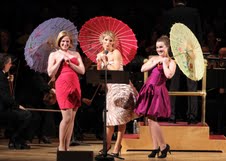T he Mikado
he Mikado
Collegiate Chorale
American Symphony Orchestra
Carnegie Hall, April 10, 2012
The roaring applause and cheers at the close of The Collegiate Chorale's concert presentation of The Mikado made it abundantly clear that the audience was utterly pleased. Gilbert and Sullivan's once most-frequently performed creation rarely gets an airing in New York, and to hear and see it in this concert version, with a full orchestra, a huge chorus, and guest principals, is certainly a welcome event.
The American Symphony Orchestra, conducted by Ted Sperling, was wonderful (they are always wonderful as far as I am concerned). The 173 voices of the Collegiate Chorale provided a vivid wall of sound in the groupings as men, "girls," and combined. Each of the principals was the kind of authentic professional required to trod the boards of Carnegie Hall's stage.
However, this was not a night for strict purists. Those raised in homes with Gilbert and Sullivan recordings and texts at hand (and who, as adults, flocked to see Britain's D'Oyly Carte Opera Company) will be left out in the cold. Richard D'Oyly Carte brought W. S. Gilbert and Arthur Sullivan together in the 1870s, nurtured their collaboration, and built the Savoy Theater for them. The company produced Gilbert and Sullivan light operas nearly continuously for 107 years, giving its last performance in February of 1982. By contrast, in this era, even well-trained and acceptably professional singers do not possess the manicured diction required to be clearly understood while performing the "patter songs" made famous by Gilbert and Sullivan. Along with perfect diction, these songs demand the maintenance of utterly perfect pitch.
Alas, The Mikado's principals displayed mixed results in being heard clearly. I conjecture that time and cost considerations, coupled with the job of coordinating a massive number of artists, undoubtedly restricted rehearsal time for this concert performance. Despite what some might consider such kill-joy quibbling, the audience had a great time and there were some very good performances, and attendees got to experience a taste of an icon of musical history. (Those with a thirst for knowledge and joy might take a look at the 1939 color motion picture version of the The Mikado made at Pinewood Studios in England and directed by Victor Schertzinger, which featured among others, Martyn Green of the D'Oyly Carte Opera Company.)
Chuck Cooper was clearly out for a good time as the Mikado, his booming voice filling the hall, his words clear as a great bass bell. His closing spoken line was a killer: As he exclaimed "That's my son!" he humorously bent the tone of his voice in a way no viewer of The Mikado could have ever expected. Both Jonathan Freeman as Poo-Bah and Steve Rosen as Pish-Tush gave solid and measured performances. Tenor Jason Danieley's Nanki-Poo was fine as the love-sick lost son of the Mikado. Kelli O'Hara as the love interest, Yum-Yum, was lovely both in voice and presence, especially when, alone with the orchestra, she sang the beautiful "The Moon and I" at the opening of the second act. Lauren Worsham (Pitti-Sing) and Amy Justman (Peep-Bo) were in fine form as Yum-Yum's cohorts. Victoria Clark was in wonderful voice in the bonkers roll of Katisha, the determined Daughter-in-Law-Elect of the Mikado, a cross between an aged Scarlett O'Hara and Baby Jane Hudson.
Christopher Fitzgerald portrayed the comic character that most people associate with The Mikado, Ko-Ko, the Lord High Executioner. The contagious fun he was having resonated with audience (but it did not resonate with this purist prune-faced reviewer). His Dudley Moore/Martin Short-inspired version of Koko offered a characterization that was all too predictable. Yet again, the audience loved it. Too bad that I could not understand his delivery of the topical lyrics written for what might be considered the most famous of all Gilbert and Sullivan songs (the one that includes the phrase "I've got a little list"). I clearly heard the audience (seated closer to the stage than I) uproariously laughing at the lyrics which must have contained hilarious contemporary references, because I did discern the words Newt and Gingrich amidst what a transcript writer would indicate as "unintelligible."
Anyone who attended this concert performance of The Mikado would have to agree the general audience thoroughly enjoyed themselves. My reservations do not take away the fact that it was a very worthwhile evening, with finely played orchestral music, competently sung choral work, and some fine performances by the guest principals. I look forward to hearing The Collegiate Chorale's final concert of their 70th Anniversary Season on May 21 at St. Bartholomew's Church, which features among other pieces Aaron Copland's In the Beginning and Francis Poulenc's Gloria accompanied by organist Christopher Creaghan.
